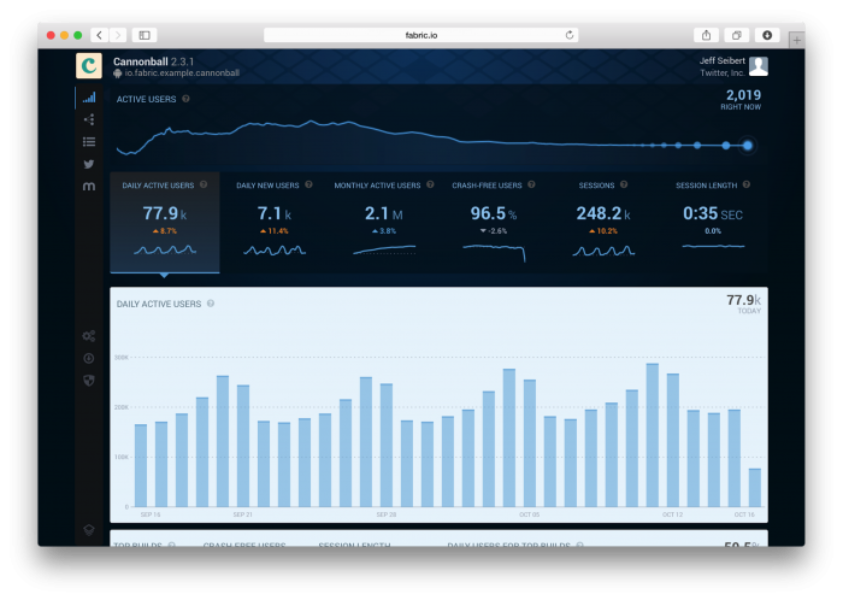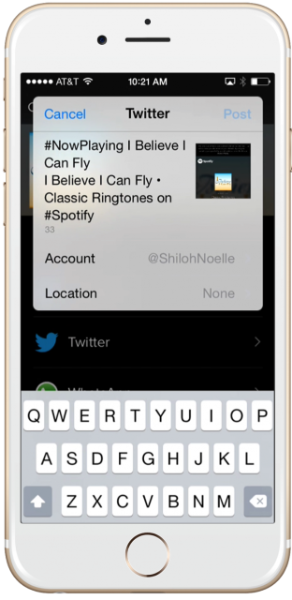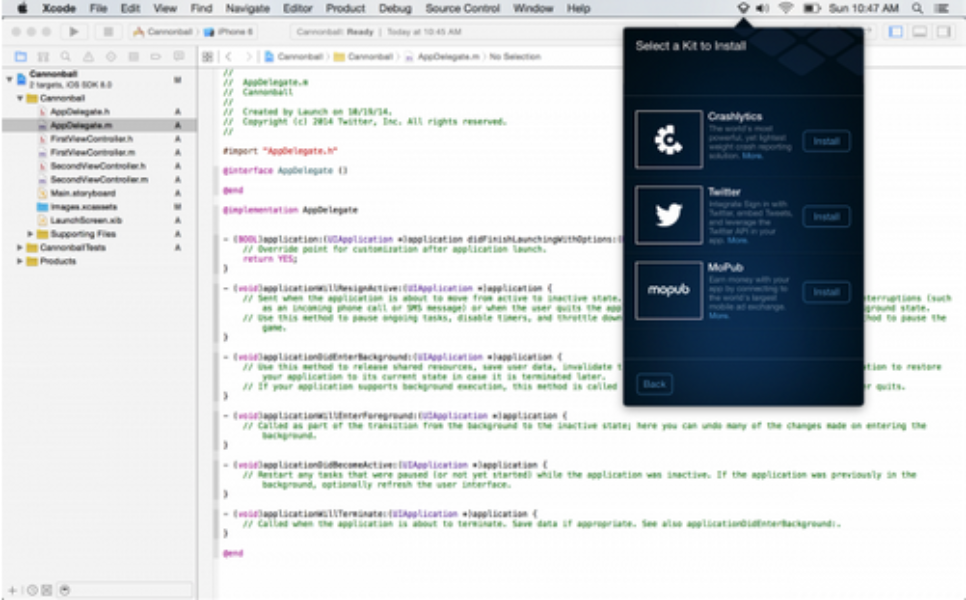Today at Flight, we announced Fabric, a modular mobile platform that makes it easy for developers to build great apps.
The Fabric platform is made of three modular kits that address some of the most common and pervasive challenges that all app developers face: stability, distribution, revenue and identity. It combines the services of Crashlytics, MoPub, Twitter and others to help you build more stable apps, generate revenue through the world’s largest mobile ad exchange and enable you to tap into Twitter’s sign-in systems and rich streams of real-time content for greater distribution and simpler identity. And Fabric was built with ease of use in mind. Installation takes just minutes, and most features only require a few lines of code – so you spend less time managing SDKs and more time building the best experience for your users.
Here’s a roundup of the Fabric Kits and more on how to start building. Fabric is available today for all attendees at the Flight conference. In the coming weeks, we’ll extend the availability of Fabric to current Crashlytics and MoPub customers and to the broader mobile developer community. Sign up at dev.twitter.com/fabric to stay updated.
Stability: Crashlytics Kit
All apps crash, and crashes have a very real impact on adoption. Because there are millions of apps to choose from, people overlook poorly-ranked apps when browsing the app stores. So figuring out why your app crashed, how many of your users are affected, what the conditions were and where to look is vital to the success of your app. But it can be a frustrating and complicated process.
Crashlytics was built to solve this issue. It makes the time between detecting, accessing and fixing bugs much shorter so you spend less time debugging and more time focused on building great apps. In just the past 30 days, Crashlytics identified over 5.5 billion crashes. And beyond just identifying them, Crashlytics is able to isolate the root cause down to the exact line of code, reducing the time it takes for you to fix the bug and submit an update.
Of course, crashes aren’t the full picture. Usability is also a critical component for successful apps. Earlier this year, Crashlytics expanded its product line with Beta by Crashlytics to help you get user feedback before an app has even shipped to production, and Answers by Crashlytics for real-time, optimized app analytics. Combined, the Fabric Crashlytics Kit – Crashlytics, Beta and Answers – help you ship high-quality, stable apps and give you a 360- degree, always-on picture of the health of your app.
 @Spotify is keenly aware of the importance of shipping high quality apps. “As the world’s largest subscription streaming music service, with over 40 million active users and over 10 million paying subscribers, it’s critical that we deliver the best, most reliable user experience,” says Jorge Espinel, Spotify’s Head of Global Business Development. “Crashlytics helps us test, build and ship great performing apps.”
@Spotify is keenly aware of the importance of shipping high quality apps. “As the world’s largest subscription streaming music service, with over 40 million active users and over 10 million paying subscribers, it’s critical that we deliver the best, most reliable user experience,” says Jorge Espinel, Spotify’s Head of Global Business Development. “Crashlytics helps us test, build and ship great performing apps.”
Today, we’re also pleased to offer a preview of NDK support in Crashlytics, so that Android developers who code in C/C++ can ship more stable apps. NDK support is essential for the next generation of Android apps to take full advantage of all the amazing new hardware coming to market. Crashlytics has a well-earned reputation for detecting insidious lower-level crashes. With NDK support, we’re gearing up to fully support Android developers.
Distribution: Twitter Kit
Getting noticed is often as difficult as getting a high-quality app shipped. Between iOS and Android, there are over two million apps available. With that in mind, we’re announcing the Twitter Kit, which includes three new products to help you tap into Twitter to get the growth you want.
With 500M Tweets per day, we have great content for all types of apps. Until now, putting Tweets in your app has meant hundreds of hours of work. Now, with just a few lines of code, you can put Tweets in your app and even style them to your app’s theme. For example, @WSJ already supports Tweets in its content management system. For years, that has enabled the Wall Street Journal to bring the worldwide conversation happening on Twitter to its stories on the web. With Fabric, they’re able to quickly render those Tweets when the same content is displayed in their native app.

Bringing global Twitter conversations into your apps can enrich your content and your user’s experience. Our Tweet composer lets people share important moments – a game score, fitness milestone, new artist or song – from within your app to their Twitter followers. These are the moments people love to share, and Fabric makes it easier than ever.

Revenue: MobPub Kit
Turning your app into a business can be daunting. The MoPub Kit makes it simple to integrate ads into your apps with just a few clicks.
MoPub is the leading monetization platform for mobile app developers, designed to maximize ad revenue for apps through a single, comprehensive platform. Unlike other monetization platforms, you don’t have to limit yourself to just a few advertisers. You can serve ads you get directly from advertisers, work with multiple ad networks, and tap into thousands of high-quality advertisers, who compete for your inventory against your other ad partners on MoPub’s exchange, MoPub Marketplace. Best of all, MoPub ensures that you can maximize your revenue by showing the ad from the highest-paying advertiser.
MoPub supports all major ad formats including banners, interstitials, video and native ads, and recently announced a new set of features to make it easier to create and experiment with native ads. With MoPub’s native location control, you can now choose the position of your ads and how often they appear in your content stream directly in the MoPub UI, giving you the power to find the right balance between ads and content in your app.
 Identity: Digits
Identity: Digits
Users are central to most apps: all those people who play a game and tracks their high scores, create 6-second videos to share, order a burger and fries for pickup. Whatever the use case, identity is central. Increasingly, the phone number, more than an email address, is the primary identifier for an individual. In developing markets, it’s often the only identifier, as smartphone owners often don’t have email addresses.
So we’re excited to announce Digits – part of the Twitter Kit – which is sign-in with phone number done right. It’s built on Twitter infrastructure so you don’t have to worry about managing multiple relationships with carriers and SMS interchanges. Digits is fully themeable so that it fits the user experience you’ve designed for your app. Digits won’t post anything on your user’s behalf since it isn’t tied to their social network accounts, including Twitter. And with Digits, your apps are ready for global adoption: it’s available immediately in 216 countries and in 28 languages, on iOS, Android and the web.
Digits also solves a number of issues for your users. Since Digits uses a phone number, there’s no need for users to remember complex passwords or usernames and all they have to share is a phone number to get started in your app.
@McDonaldscorp uses Digits in its McDonald’s Alarm App. The app enables friends to share offers for McDonald’s food and beverages. In order to redeem the offer, a person must authenticate as a real user. McDonald’s felt that social sign-ins put too much burden on a user to share personal details, and that email addresses and passwords were too often forgotten or onerous to manage. Digits enables McDonald’s to quickly authenticate real users and get them into the app with a minimum of friction.
Getting Fabric
Fabric is lightweight. You simply pick and choose which Kits you’d like to include in your app. Today, we’re shipping the Crashlytics Kit, the Twitter Kit, and the MoPub Kit, and they couldn’t be easier to integrate.
Downloading multiple SDKs and keeping them up to date can be a real pain. (How many libraries and SDKs are in the apps you’ve built? Are you sure you’re on the latest version of every one? When you add an Android SDK, is it so bloated with features that you quickly run up against the Dalvik method limit?) We didn’t want to add to this burden you already face every day — we want to fix it so you are never overwhelmed by SDK bloat again.
 Select only the kits you want in the Fabric Kit selector.
Select only the kits you want in the Fabric Kit selector.
Fabric is integrated with the IDEs you use, including Xcode, Eclipse, Android Studio and IntelliJ, and also integrated with the automated build and testing tools you use. And so you never have to worry about whether you’re on the latest version of a Kit, Fabric will alert you when updates are available.
Fabric is available today for all attendees at Flight. We will be rolling it to the broader mobile developer community soon. Sign up at dev.twitter.com/fabric to get on the list.
Finally, thank you.
When we started working on what would become Fabric over a year ago, our goal was to take what we learned from building Crashlytics, MoPub and Twitter itself, and apply those lessons to a host of issues all mobile app developers face. We’ve learned firsthand the challenges to building great mobile apps, and in talking to app developers like you, we’ve learned how pervasive these challenges are. Our mission is to build great developer products that help solve those challenges.
Fabric isn’t just about us; we think the tooling behind Fabric that manages, installs and updates Kits is broadly useful to every SDK vendor. If you manage an SDK and you’re interested in working with us, write to us at [email protected]. We’d love to hear from you.
Did someone say … cookies?
X and its partners use cookies to provide you with a better, safer and
faster service and to support our business. Some cookies are necessary to use
our services, improve our services, and make sure they work properly.
Show more about your choices.